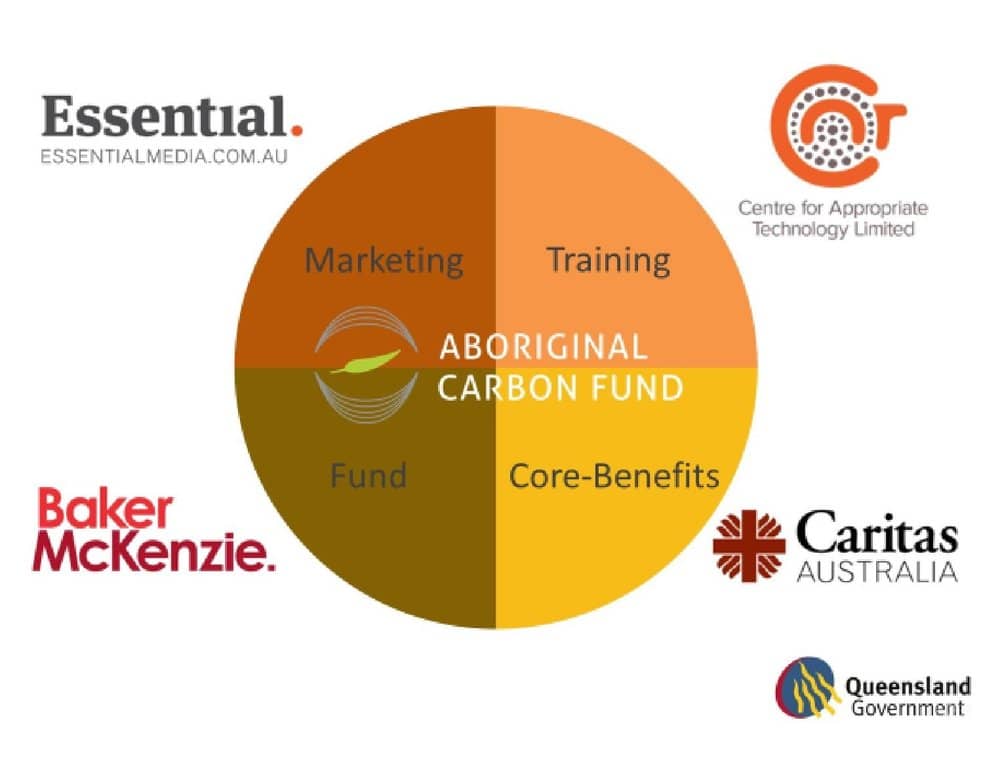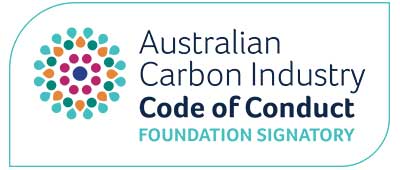Aboriginal Carbon Fund and our Partnerships
The Aboriginal Carbon Fund (AbCF) is fully staffed by Aboriginal people and we cultivate positive working relationships with a range of associates and project partners. This way of working to achieve Indigenous empowerment is refreshing in Aboriginal Australia. It has led to the development of the Indigenous-to-Indigenous strategy to verify cultural, social and environmental core benefits of carbon projects using a strength based approach by Aboriginal rangers and Traditional Owners.
Sustainable, Aboriginal led economic prospects are rare across northern Australia.
Aboriginal carbon farming is a new industry and the AbCF won a tender from the Queensland Department of Environment and Heritage Protection to foster the development of the industry which includes the following key components:

Relationships Diagram
• The establishment of a carbon investment fund with guidance from Baker & McKenzie law firm will enable the direct purchase of carbon credits from Aboriginal and non-Aboriginal carbon farmers for a premium with cultural, social and environmental verified core benefits. What sets this fund apart is the opportunity for inter-generational wealth creation. That is rangers and Traditional Owners should still be able to accrue a benefit in 50 years’ time not just on a spot trade.
It is proposed to have three classes of Australian Carbon Credit Units (ACCU) as follows;
– Ochre carbon: ACCU + verified cultural, social and environmental core benefits,
– Black carbon: ACCU + verified social and environmental core benefits,
– Gold carbon: ACCU + verified environmental core benefits.
A national consultation process on the investment fund concept by independent consultants was funded by the Indigenous Land Corporation and fund design workshops are taking place. It is a work in progress and a farmer co-op model is envisaged with broad industry representation. We are open to great ideas!

• The core benefits verification approach acknowledges Aboriginal people as the experts in the indigenous-to-indigenous strategy. The verification framework for the cultural, social and environmental core benefits is being developed in partnership with Caritas Australia who have a wealth of international experience.
Almost all Aboriginal carbon projects have numerous cultural, social and environmental core benefits that can be proven as real, measurable and verifiable. This work can and should be undertaken by Aboriginal rangers and Traditional Owners as it will utilise their skill set and add value to their carbon credits in the voluntary market.
A community reference group is established (join in if interested), numerous presentations given at industry forums and a wide-ranging peer review process providing great feedback. First Nations in British Colombia and Maori groups in New Zealand are also interested in the indigenous-to-indigenous strategy as it does not rely upon external non-Indigenous people.
• The establishment of a new 5-day training course in Aboriginal carbon farming through the Centre for Appropriate Technology Ltd (another Aboriginal organisation).
Many Aboriginal rangers and Traditional Owners involved in savanna burning on their traditional land want a greater understanding of the carbon industry. This training will enable a greater understanding of the industry tools, markets as well as how to independently verify core benefits. This may involve qualitative measures such as ‘pride’ and/or quantitative measures to verify Traditional Owners are employment as rangers. Good video recording techniques to present local stories of working on country will also be taught.
Regional Aboriginal organisations can and should be the hub for training in carbon farming of Aboriginal rangers and Traditional Owners.
An Industry Reference Group is established and 20 letters of support provided by Aboriginal organisations, corporate buyers and industry groups for accreditation purposes.
An EOI to pilot the training course in northern Australia has been released, so if interested please be in contact.
• The establishment of a marketing and social media strategy around carbon farming on Aboriginal lands through working with Essential Media. We still have a long way to go in promoting this new industry to corporate Australia as a means for them to achieve their UN Sustainable Development Goals, Reconciliation Action Plans and Corporate Social Responsibility goals.
Another challenge identified by the AbCF is to encourage all Australian Catholic Schools to be carbon neutral by 2025. We have a warm spirit, the experience and welcome all collaboration to achieve this climate justice endeavour!
The thing that has struck me most living and working in the Northern Territory is how community development approaches in Aboriginal communities are still straight out of the 1950s and lagging behind the empowerment discourse that Indigenous people are exposed to in the international development sector.
Nevertheless, community development through sustainable carbon farming on Aboriginal lands is now a small fire which will continue to grow and be a useful tool in the right hands.
Aboriginal Carbon Farming
Savanna burning is the right people, burning the right country, in the right way.
Core benefits is the right people, asking the right questions, in the right way.
Our work, our jobs, our country…our future!
























